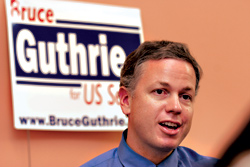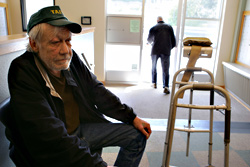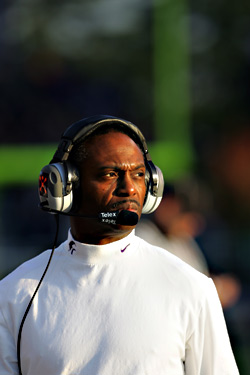LONGTIME SEATTLE TIMES managing editor Alex MacLeod announced his retirement this week. In a Feb. 3 note to staffers, he wrote, “It’s time for me to move on and do something different with my life.” MacLeod, who’s been managing editor for 17 years, is taking a sweetened retirement package. His father, Henry, was also a long-tenured managing editor at the paper. MacLeod’s retirement takes effect June 30.
The move was not a huge surprise to newsroom veterans, who’ve seen MacLeod take long breaks from the paper, presumably to mull his future. In 2001, MacLeod was at his getaway in the San Juan Islands during the 9/11 attacks, the biggest news story in ages. He didn’t cut his break short to guide the newsroom during the ensuing scramble to cover the story. Still, during his tenure at the paper, the Times has won five Pulitzer Prizes. Some Times veterans credit him for going to top management and coming back with the resources to do long, expensive investigative projects.
Not everyone in the newsroom will be sad to see him go. MacLeod’s management style was a mix of micromanagement and detachment from day-to-day story development. Although he wasn’t a hands-on manager with articles, he was quick to level Times personnel with sarcasm for any flaws he found in a piece once it ran. That ran counter to the Times‘ familylike culture, where the emphasis is often more on getting along than on unstinting criticism. Times editors often dreaded going into the paper’s morning news meeting never knowing who was going to get chewed out.
Ross Anderson, a Pulitzer Prize winner and former Times staff member, says MacLeod’s style helped the paper.
“It needed a tough guy,” he says. “He made the paper better.”
MacLeod will be replaced by a current Times editor, says the newspaper’s spokesperson, Kerry Coughlin. Inside betting is that the nod will go to David Boardman, currently assistant managing editor for investigations, business, and sports. He’s credited with being the force behind some of the Times‘ Pulitzer Prize packages and is popular in the newsroom. Other rumored contenders include Suki Dardarian, assistant managing editor, Metro, and Jacqui Banaszynski, assistant managing editor, Sunday.
Whoever replaces MacLeod will take over a daily newspaper operation that could be on the verge of becoming the only game in town. That’s because after three consecutive years of losses, the Times is believed to be planning to invoke an escape clause under its joint operating agreement with the Seattle Post-Intelligencer that could result in the closure of one of the two dailies. MacLeod is in lockstep with Times publisher Frank Blethen, who’s recently opined that his paper will emerge as the lone daily in town. (See “Pulp Friction,” p. 20.)
“The only change I see in the JOA is the disappearance of the P-I and the opportunity for the Times to control the market,” says MacLeod. “I don’t see any reason to imagine any other outcome.”
There is likely to be some change at the paper once MacLeod leaves, if only in the tone of management.
“He’s such a dominant personality that his leaving will make a difference,” says Anderson.








